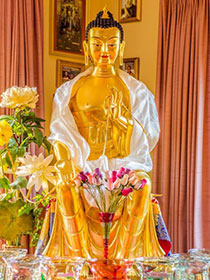- Home
- FPMT Homepage
Foundation for the Preservation of the Mahayana Tradition
The FPMT is an organization devoted to preserving and spreading Mahayana Buddhism worldwide by creating opportunities to listen, reflect, meditate, practice and actualize the unmistaken teachings of the Buddha and based on that experience spreading the Dharma to sentient beings. We provide integrated education through which people’s minds and hearts can be transformed into their highest potential for the benefit of others, inspired by an attitude of universal responsibility and service. We are committed to creating harmonious environments and helping all beings develop their full potential of infinite wisdom and compassion. Our organization is based on the Buddhist tradition of Lama Tsongkhapa of Tibet as taught to us by our founders Lama Thubten Yeshe and Lama Thubten Zopa Rinpoche.
- Willkommen
Die Stiftung zur Erhaltung der Mahayana Tradition (FPMT) ist eine Organisation, die sich weltweit für die Erhaltung und Verbreitung des Mahayana-Buddhismus einsetzt, indem sie Möglichkeiten schafft, den makellosen Lehren des Buddha zuzuhören, über sie zur reflektieren und zu meditieren und auf der Grundlage dieser Erfahrung das Dharma unter den Lebewesen zu verbreiten.
Wir bieten integrierte Schulungswege an, durch denen der Geist und das Herz der Menschen in ihr höchstes Potential verwandelt werden zum Wohl der anderen – inspiriert durch eine Haltung der universellen Verantwortung und dem Wunsch zu dienen. Wir haben uns verpflichtet, harmonische Umgebungen zu schaffen und allen Wesen zu helfen, ihr volles Potenzial unendlicher Weisheit und grenzenlosen Mitgefühls zu verwirklichen.
Unsere Organisation basiert auf der buddhistischen Tradition von Lama Tsongkhapa von Tibet, so wie sie uns von unseren Gründern Lama Thubten Yeshe und Lama Thubten Zopa Rinpoche gelehrt wird.
- Bienvenidos
La Fundación para la preservación de la tradición Mahayana (FPMT) es una organización que se dedica a preservar y difundir el budismo Mahayana en todo el mundo, creando oportunidades para escuchar, reflexionar, meditar, practicar y actualizar las enseñanzas inconfundibles de Buda y en base a esa experiencia difundir el Dharma a los seres.
Proporcionamos una educación integrada a través de la cual las mentes y los corazones de las personas se pueden transformar en su mayor potencial para el beneficio de los demás, inspirados por una actitud de responsabilidad y servicio universales. Estamos comprometidos a crear ambientes armoniosos y ayudar a todos los seres a desarrollar todo su potencial de infinita sabiduría y compasión.
Nuestra organización se basa en la tradición budista de Lama Tsongkhapa del Tíbet como nos lo enseñaron nuestros fundadores Lama Thubten Yeshe y Lama Zopa Rinpoche.
A continuación puede ver una lista de los centros y sus páginas web en su lengua preferida.
- Bienvenue
L’organisation de la FPMT a pour vocation la préservation et la diffusion du bouddhisme du mahayana dans le monde entier. Elle offre l’opportunité d’écouter, de réfléchir, de méditer, de pratiquer et de réaliser les enseignements excellents du Bouddha, pour ensuite transmettre le Dharma à tous les êtres. Nous proposons une formation intégrée grâce à laquelle le cœur et l’esprit de chacun peuvent accomplir leur potentiel le plus élevé pour le bien d’autrui, inspirés par le sens du service et une responsabilité universelle. Nous nous engageons à créer un environnement harmonieux et à aider tous les êtres à épanouir leur potentiel illimité de compassion et de sagesse. Notre organisation s’appuie sur la tradition guéloukpa de Lama Tsongkhapa du Tibet, telle qu’elle a été enseignée par nos fondateurs Lama Thoubtèn Yéshé et Lama Zopa Rinpoché.
Visitez le site de notre Editions Mahayana pour les traductions, conseils et nouvelles du Bureau international en français.
Voici une liste de centres et de leurs sites dans votre langue préférée
- Benvenuto
L’FPMT è un organizzazione il cui scopo è preservare e diffondere il Buddhismo Mahayana nel mondo, creando occasioni di ascolto, riflessione, meditazione e pratica dei perfetti insegnamenti del Buddha, al fine di attualizzare e diffondere il Dharma fra tutti gli esseri senzienti.
Offriamo un’educazione integrata, che può trasformare la mente e i cuori delle persone nel loro massimo potenziale, per il beneficio di tutti gli esseri, ispirati da un’attitudine di responsabilità universale e di servizio.
Il nostro obiettivo è quello di creare contesti armoniosi e aiutare tutti gli esseri a sviluppare in modo completo le proprie potenzialità di infinita saggezza e compassione.
La nostra organizzazione si basa sulla tradizione buddhista di Lama Tsongkhapa del Tibet, così come ci è stata insegnata dai nostri fondatori Lama Thubten Yeshe e Lama Zopa Rinpoche.
Di seguito potete trovare un elenco dei centri e dei loro siti nella lingua da voi prescelta.
- 欢迎 / 歡迎
简体中文
“护持大乘法脉基金会”( 英文简称:FPMT。全名:Foundation for the Preservation of the Mahayana Tradition) 是一个致力于护持和弘扬大乘佛法的国际佛教组织。我们提供听闻,思维,禅修,修行和实证佛陀无误教法的机会,以便让一切众生都能够享受佛法的指引和滋润。
我们全力创造和谐融洽的环境, 为人们提供解行并重的完整佛法教育,以便启发内在的环宇悲心及责任心,并开发内心所蕴藏的巨大潜能 — 无限的智慧与悲心 — 以便利益和服务一切有情。
FPMT的创办人是图腾耶喜喇嘛和喇嘛梭巴仁波切。我们所修习的是由两位上师所教导的,西藏喀巴大师的佛法传承。
繁體中文
護持大乘法脈基金會”( 英文簡稱:FPMT。全名:Found
ation for the Preservation of the Mahayana Tradition ) 是一個致力於護持和弘揚大乘佛法的國際佛教組織。我們提供聽聞, 思維,禪修,修行和實證佛陀無誤教法的機會,以便讓一切眾生都能 夠享受佛法的指引和滋潤。 我們全力創造和諧融洽的環境,
為人們提供解行並重的完整佛法教育,以便啟發內在的環宇悲心及責 任心,並開發內心所蘊藏的巨大潛能 — 無限的智慧與悲心 – – 以便利益和服務一切有情。 FPMT的創辦人是圖騰耶喜喇嘛和喇嘛梭巴仁波切。
我們所修習的是由兩位上師所教導的,西藏喀巴大師的佛法傳承。 察看道场信息:
- FPMT Homepage
- News/Media
-
- Study & Practice
-
-
- About FPMT Education Services
- Latest News
- Programs
- New to Buddhism?
- Buddhist Mind Science: Activating Your Potential
- Heart Advice for Death and Dying
- Discovering Buddhism
- Living in the Path
- Exploring Buddhism
- FPMT Basic Program
- FPMT Masters Program
- FPMT In-Depth Meditation Training
- Maitripa College
- Lotsawa Rinchen Zangpo Translator Program
- Universal Education for Compassion & Wisdom
- Online Learning Center
-
- Prayers & Practice Materials
- Overview of Prayers & Practices
- Full Catalogue of Prayers & Practice Materials
- Explore Popular Topics
- Benefiting Animals
- Chenrezig Resources
- Death & Dying Resources
- Lama Chopa (Guru Puja)
- Lama Zopa Rinpoche: Compendium of Precious Instructions
- Lama Zopa Rinpoche: Life Practice Advice
- Lama Zopa Rinpoche Practice Series
- Lamrim Resources
- Mantras
- Prayer Book Updates
- Purification Practices
- Sutras
- Thought Transformation (Lojong)
- Audio Materials
- Dharma Dates - Tibetan Calendar
- Translation Services
- Publishing Services
- Ways to Offer Support
- Prayers & Practice Materials
-
- Teachings and Advice
- Find Teachings and Advice
- Lama Zopa Rinpoche Advice Page
- Lama Zopa Rinpoche: Compendium of Precious Instructions
- Lama Zopa Rinpoche Video Teachings
- ༧སྐྱབས་རྗེ་བཟོད་པ་རིན་པོ་ཆེ་མཆོག་ནས་སྩལ་བའི་བཀའ་སློབ་བརྙན་འཕྲིན།
- Podcasts
- Lama Yeshe Wisdom Archive
- Buddhism FAQ
- Dharma for Young People
- Resources on Holy Objects
- Teachings and Advice
-
-
*If a menu item has a submenu clicking once will expand the menu clicking twice will open the page.
-
-
- Centers
-
- Teachers
-
- Projects
-
-
-
-
*If a menu item has a submenu clicking once will expand the menu clicking twice will open the page.
-
-
- FPMT
-
- Shop
-
-
-
The Foundation Store is FPMT’s online shop and features a vast selection of Buddhist study and practice materials written or recommended by our lineage gurus. These items include homestudy programs, prayers and practices in PDF or eBook format, materials for children, and other resources to support practitioners.
Items displayed in the shop are made available for Dharma practice and educational purposes, and never for the purpose of profiting from their sale. Please read FPMT Foundation Store Policy Regarding Dharma Items for more information.
-
-
1
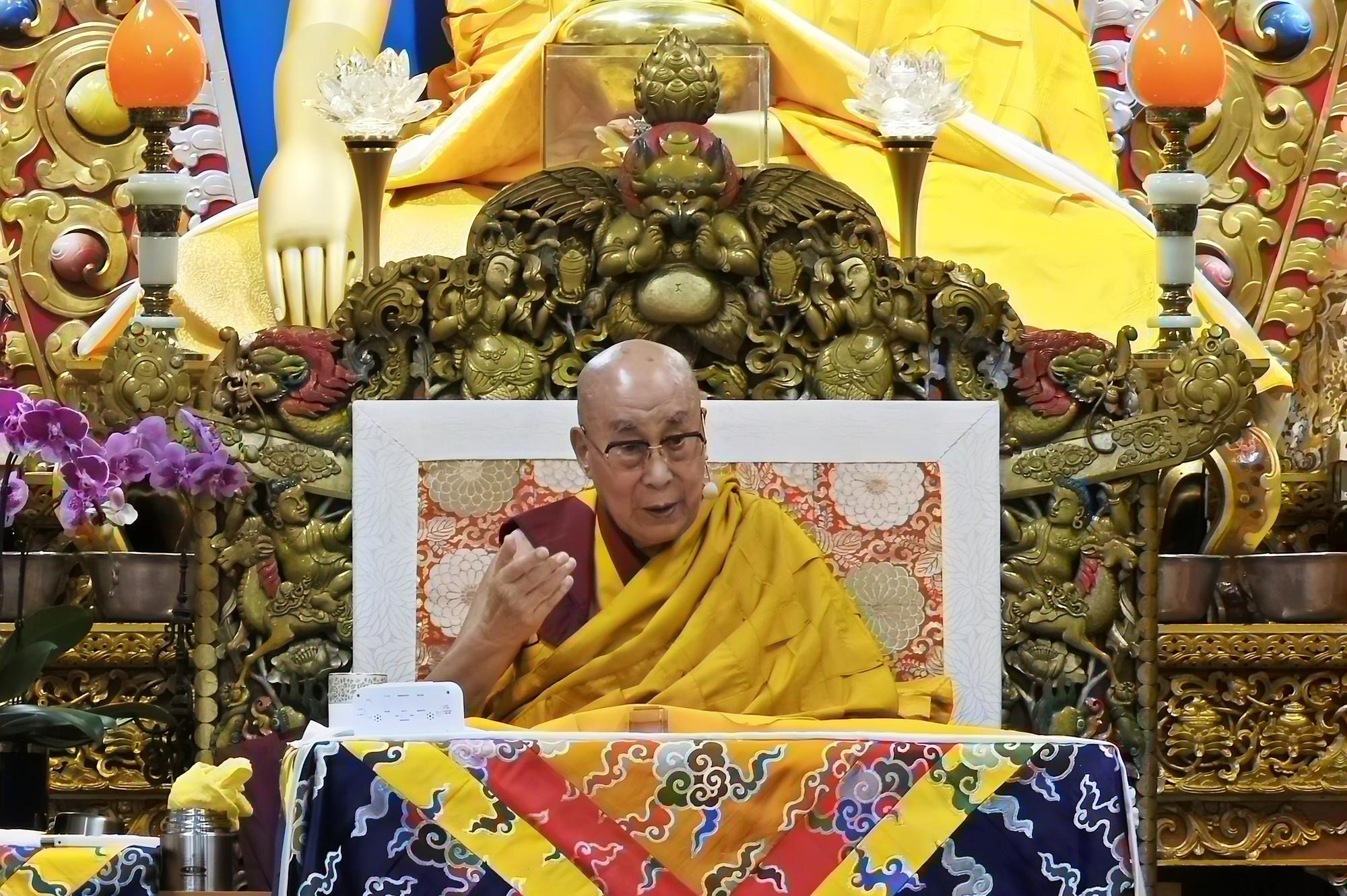
His Holiness the Dalai Lama giving public teachings in person, McCleod Ganj, H.P., India, September 2022. Photo by Jean-Luc Castagner.
Buddhist students around the world have learned to appreciate technology and the blessings of Zoom since the Covid-19 pandemic halted travel and large events or gatherings for most of us for nearly three years. In September, His Holiness the Dalai Lama offered an in-person teaching in McLeod Ganj, Dharamsala, at his monastery, Namgyal Monastery.
We are so happy to share two moving reports of these teachings – one from long-time French student Jean-Luc Castagner, who was able to speak to other students from around the world about their experience with His Holiness’s teachings, and one from Ven. Tenzin Tsultrim, on behalf of a group from Amitabha Buddhist Centre, Singapore, who attended these teachings together.
Return to McLeod: His Holiness the Dalai Lama’s Teachings in a Post-COVID World
By Jean-Luc Castagner
His Holiness the Fourteenth Dalai Lama has been giving public teachings for decades in the little town of McLeod Ganj above Dharamsala (Himachal Pradesh, India), and the flow of Injis (English speakers/Westerners, in Tibetan) that marks the streets here is a constant indicator of the importance and relevance that His Holiness’s message is always touching a wide audience.
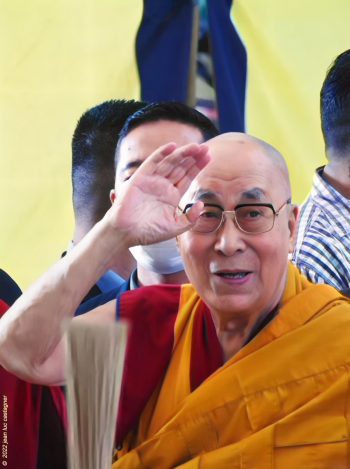
His Holiness the Dalai Lama, September 2022. Photo by Jean-Luc Castagner.
The pandemic that has put these public teachings on hold is now almost behind us and we are now able to attend in person and be in the presence of His Holiness again. In the mornings of September 15 and 16, 2022, His Holiness gave a two-day teaching on Chandrakirti’s Entering the Middle Way, a prominent text written as a commentary to Nagarjuna’s Mūlamadhyamakakārikā (The Fundamental Verses on the Middle Way). It clarifies Nagarjuna’s Middle Way approach with respect to the lack of intrinsic existence as propounded by the Madhyamika Prasangika school of thought. The auto-commentary was further written to clarify its meaning for Chandrakirti’s students. His Holiness has given similar teachings on these texts many times in the past.
Two and a half years have passed since my return to McLeod Ganj. March 21, 2020 was my last day there. That morning, all the students of the Lotsawa Rinchen Zangpo Translation Program (LRZTP), of which I was a part, formally graduated. I remember that time very clearly because of the commotion that the newly emerging virus, now famously known as Covid-19, was causing havoc all over the planet, and the prospect of being stuck in India for a long period of time, in probably dire circumstances, was daunting to me and many other people. My friend and classmate, Lola, and I decided to travel back to France together quickly, after experiencing a few plane cancellations and delays. It turns out that we were on one of the last planes that were allowed to leave India on the morning of March 22, as all of Indian air travel was to be shut down at 6 am on that day. A handful of my classmates had decided to stay in India, thinking that this situation would not last long, that it too would come to pass. Little did they know about the dreadful duration of the restrictions they would be submitted to during the lockdown, but somehow most of them experienced it with a happy mind and made the most out of it. Had it not been for the then-unknown health troubles that my late father was in a year later, I think retrospectively it might have been better to stay there and continue improving my Tibetan skills, which during the next two years in France took a hard hit.
Indeed, Covid-19 has had a tremendous impact on our lives. However, for those lucky ones like myself who could stay in the countryside during the various lockdowns, it was a very pleasant experience. For others less fortunate, the restrictions impacted not only their physical health but also their mental health.
During the two years of the LRZTP, one of the perks of staying in McLeod Ganj was of course to be able to attend His Holiness’ teachings, during which he put more and more emphasis on climate change and how the Buddhist view articulates the interdependent nature of our existence at a personal, individual level, but also on a global, world scale. This has now become a global phenomenon and will hopefully create some sense of urgency, but the notion of interdependence and responsibility, fused within the framework of a compassionate view of our world, is now needed more than ever.
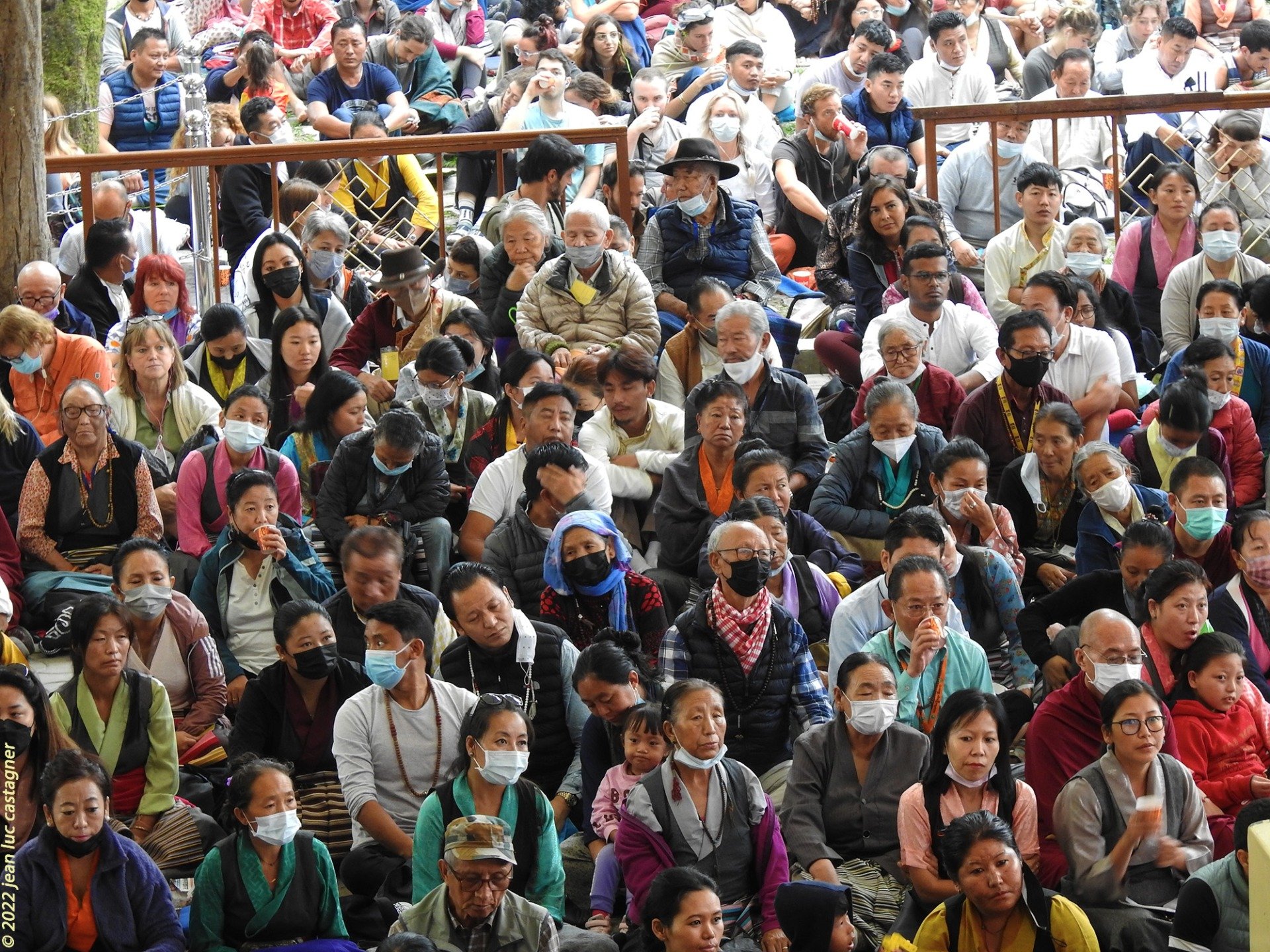
Attendees of His Holiness the Dalai Lama’s teaching, McCleod Ganj, H.P. India, September 2022. Photo by Jean-Luc Castagner.
These teachings were requested by a group of Southeast Asians and the majority of the foreign participants who attended were from Vietnam, Singapore, Taiwan, and China. However, this time there seemed to be less Westerners, as the space on the ground floor outside had plenty of room left for sitting. This was contrasted with the June 2022 teachings for which the doors were shut by 7a.m. as it had very quickly reached full capacity.
For those who had attended the teachings in previous years, not much change is actually visible. Externally of course some improvements have been added in the temple, such as the new elevators that allow His Holiness to access the teaching hall. The video cameras used to stream the teachings are increasing in number it seems, with even a wireless feed that follows His Holiness closely as he slowly makes his way to the temple from his residence.
Mimi is a young teacher from Singapore, who came here to be able to learn and develop insights about herself and others, and also to be as close to His Holiness as possible. The profound impact that these teachings had on her, in her own words, “Really, it’s all about being loving and affectionate. That was mainly something that encouraged me, to be fearless in overcoming selfish delusions and have courage in the heart. Any negative situation is an opportunity to practice more love and affection toward my mind and others, and see the transformation from within. The study of emptiness is to really be able to investigate over and over the cause and effect of an object you have been obsessing about, and then to be disciplined in the mind, to be able to bring reasoning, and not conclude simply.”
Dharma can be understood at many levels and used unconditionally in various areas of our lives. Whether we are full-time at work, have the leisure to travel the world, supporting our family, or living a celibate life; the teachings apply to all situations, because we experience it all with our mind. Alessia, a Russian girl from Moscow who has been studying Tibetan and Buddhist philosophy at the Library of Tibetan Works and Archives for five months now, said, “The most important is what is in my mind, if I have bad things from which I suffer, I have to work with myself. So it is not outside of me, it’s only my mind. This is the most important part.”
Change is also an inevitable part of our existence. Personally, my first visit to McLeod Ganj was in 2007, and for sure it was different than now, the number of hotels was considerably lower, eating out was restricted to a few good options, and the garbage situation was very difficult. Since then, McLeod Ganj has banned plastic bags, and there are now a few locations where waste can be left to be disposed of. Compared to then, the town is much cleaner, and the variety of dining options (Tibetan, Indian, Japanese, Italian, Korean, etc.) reflects well its cosmopolitan atmosphere. As a French person, I especially appreciate the famous cakes that made the reputation of a few places such as Coffee Talk near the temple.
For some like Dimitri, who has been living in McLeod Ganj for 10 years now, his take on the evolution of McLeod Ganj is double-sided, “It became more comfortable to live here, I know from before. If you want to study it’s good, but if you want to do practice or meditation, the atmosphere has changed for the worse, because there are a lot of tourists coming, a lot of distractions. Before it looked like a monk’s village, with monks doing prayers and reciting mantras, but now it’s a tourist place and the atmosphere is different. If I want to do meditation or go deeper into my practice, I move from here for a short time and I come back. But before it was not like this”
While staying in McLeod Ganj during the two years of the LRZTP, I remember noticing that the Tibetan community here had become very proactive with various environmental projects and regular demonstrations. If one reflects on the current state of our planet, it appears that mundane interdependence is not even valued nor considered at government levels. His Holiness’s timeless approach of the Buddha’s teachings manages to integrate and support the various issues that affect us all, such as how to deal with anger, stress, climate change, war, and epidemics within our minds. It is our duty as responsible Buddhists, who, like all sentient beings, do not wish to suffer and only wish for happiness, to uphold his message and advice and implement it in our daily lives to the best of our abilities. It is such a precious opportunity to attend these teachings and to see His Holiness directly. If you have the resources and time to visit McLeod Ganj, this will be very worthwhile. But be mindful as the cakes here are atrociously delicious.
Jean-Luc has been a student of Lama Zopa Rinpoche since 1998 and has been volunteering in various FPMT centers over the years, particularly in Institut Vajra Yogini and Nalanda Monastery near Toulouse, France. He recently graduated from the Lotsawa Rinchen Zangpo Translator Program in Dharamsala and is now pursuing his study of the Tibetan language in Nepal.
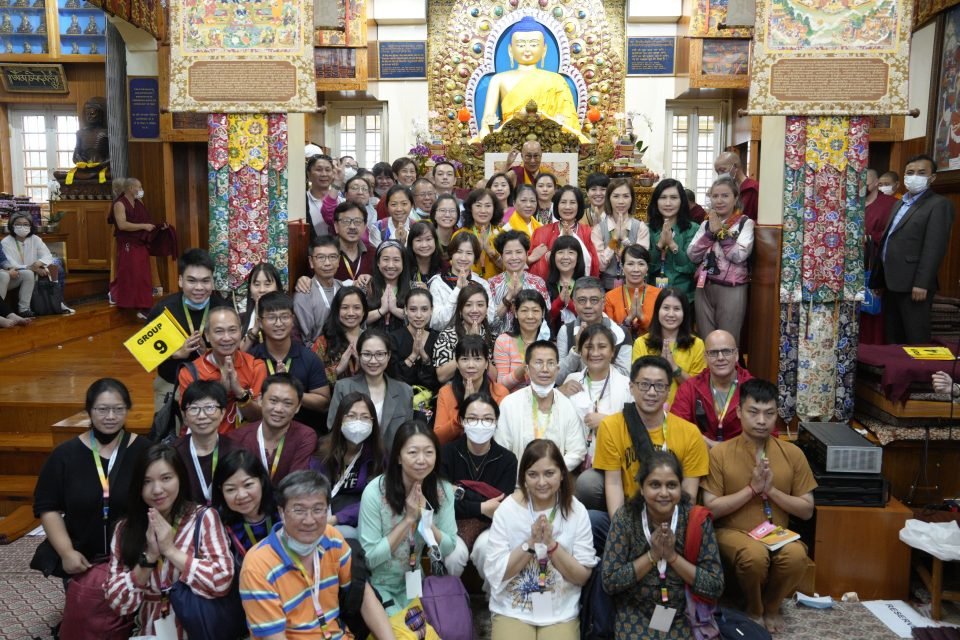
Southeast Asian group with His Holiness the Dalai Lama, September 2022. Photo courtesy of the Office of His Holiness the Dalai Lama.
Amitabha Buddhist Centre Students from Singapore Attend His Holiness’s Teachings
By Ven. Tenzin Tsultrim
An air of enthusiasm and excitement accompanied 33 of us on our Amitabha Buddhist Centre (ABC) tour to attend His Holiness the Dalai Lama’s teachings for Southeast Asian students in Dharamsala, India. Our week-long trip from September 11-19 was joyfully welcomed by all. In the interim, we had been thankful to be able to receive His Holiness’s precious teachings online and even through Zoom. However, nothing could compare to sitting in the gompa of Namgyal Monastery itself as His Holiness continued teaching from where he had left off previously in Chandrakirti’s Entering the Middle Way.
The majority of the ABC travel group are very new to the Dharma and to ABC, or are engaged with other traditions such as the Chinese Mahayana tradition or another religion. However, the rare opportunity to be able to actually see His Holiness in person was what drew many of them to sign up with our tour. We also welcomed back a father and son duo who were ABC members from 30 years ago!
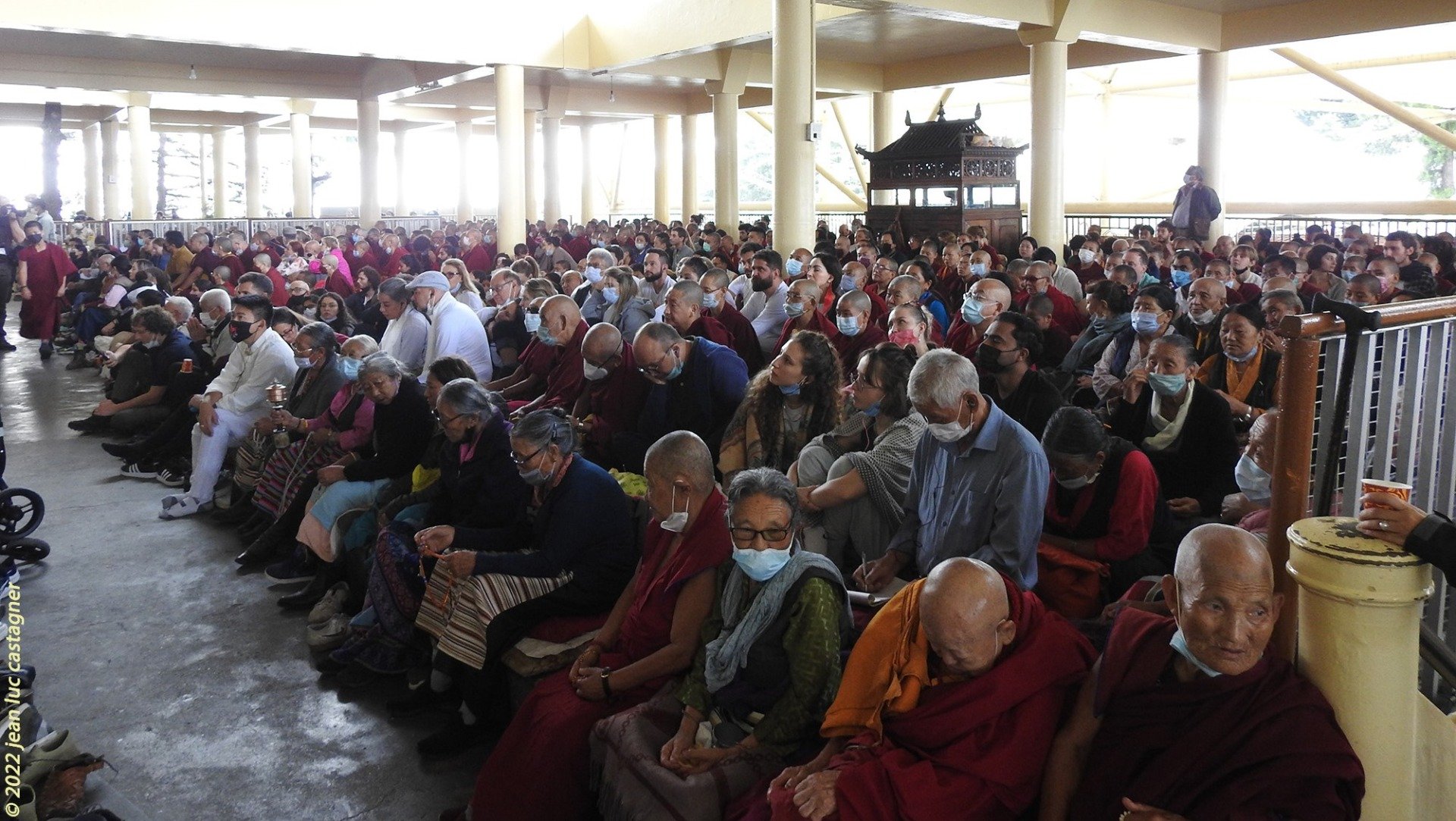
Some of the attendees for His Holiness the Dalai Lama’s teaching, McCleod Ganj, H.P. India, September 2022. Photo by Jean Luc Castagner.
Besides attending the two-day teachings at the main temple, our group had the opportunity for a pilgrimage to Tso Pema at Rewalsar, the sacred lake where Guru Rinpoche, Padmasambhava, is said to have been miraculously born from a lotus. The full-day road trip included visits to three holy caves where Guru Rinpoche had meditated. These included a cave where Guru Rinpoche had planted his footprint. We also sat in the first cave to meditate on Guru Rinpoche, recite the Sampa Nyurdrupma prayers, the mantra of Guru Rinpoche, and dedicate strongly for the peace and happiness of all beings in the world in these troubled times. One of the first-timers later shared that the experience of being able to do these prayers was very meaningful and special to her as she had never performed such prayers before. She was very grateful to be guided in this practice, saying that it was a memorable experience for her.
Another side tour for our group was a visit up to our sister center, Tushita Meditation Centre. Everyone showed themselves to be very good sports in taking the steep hike up the walking trail to Tushita – albiet puffing and panting here and there, but everyone made it! We were warmly welcomed by Tushita Centre’s Spiritual Program Coordinator, Ven. Kunphen. After a comprehensive briefing and tour of Tushita’s holy objects provided by Ven. Kunphen and her assistants, we were treated to a generous and sumptuous buffet that included momos, a variety of cakes and steaming cups of chai.
Other highlights for our participants included an audience with His Eminence Yongzin Ling Rinpoche, observing a post-teaching fire puja at Namgyal Monastery, and a visit to Gyuto Tantric Monastery and Norbulingka. Many also got to view the holy relics of the previous incarnation of Ling Rinpoche in a museum inside His Holiness’s private residence. To celebrate the end of our visit, we all sat down to a dinner together at the newly-refurbished Pema Thang Guesthouse restaurant.
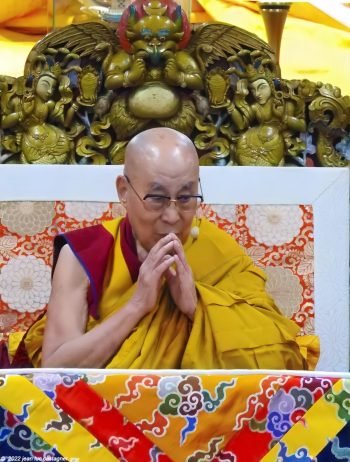
His Holiness giving teachings, McLeod Ganj, H.P., India, September 2022. Photo by Jean-Luc Castagner.
Very positive comments and feedback were heard all round, and there were many happy, beaming faces. One participant who was on her first visit to Dharamsala rated her experience as “5-star” and “A-plus!” It is remarkable that impermanence and our past accumulation of merit brought us over to Dharamsala and back, safe, sound, and filled with special memories and countless blessings. We look forward to receiving the next round of His Holiness’s teachings, so kindly and efficiently organized by Tibetan Buddhist Centre, Singapore.
Camaraderie, open-mindedness, warmth and understanding accompanied us throughout our nine-day tour. Besides the coordination efforts supplied by Executive Committee member Vincent Koh, Sangye Quek and myself, several of our group, older and newer members alike, stepped up readily to help where needed. Everyone contributed to making this a peaceful, happy journey!
Ven. Tenzin Tsultrim is regional representative for IMI Southeast Asia and a long-time member and student at Amitabha Buddhist Centre in Singapore.
To view the current teaching schedule of His Holiness, we invite you to please visit the official website of the Office of His Holiness the Dalai Lama. Most of His Holiness’s teachings offer a live webcast so please check the website regularly for opportunities.
His Holiness will give three days of teachings on the mornings of December 29-31 at the Kalachakra Teaching Ground, Bodhgaya. On December 29 and 30 His Holiness will give teachings on Nagarjuna’s Commentary on Bodhicitta (jangchup semdrel). On December 31 His Holiness will confer the Blessing of Twenty-one Taras (dolma 21 jenang). We look forward to sharing details about these precious teachings after the event.
- Tagged: dalai lama, his holiness the dalai lama
- Home
- News/Media
- Study & Practice
- About FPMT Education Services
- Latest News
- Programs
- New to Buddhism?
- Buddhist Mind Science: Activating Your Potential
- Heart Advice for Death and Dying
- Discovering Buddhism
- Living in the Path
- Exploring Buddhism
- FPMT Basic Program
- FPMT Masters Program
- FPMT In-Depth Meditation Training
- Maitripa College
- Lotsawa Rinchen Zangpo Translator Program
- Universal Education for Compassion & Wisdom
- Online Learning Center
- Prayers & Practice Materials
- Overview of Prayers & Practices
- Full Catalogue of Prayers & Practice Materials
- Explore Popular Topics
- Benefiting Animals
- Chenrezig Resources
- Death & Dying Resources
- Lama Chopa (Guru Puja)
- Lama Zopa Rinpoche: Compendium of Precious Instructions
- Lama Zopa Rinpoche: Life Practice Advice
- Lama Zopa Rinpoche Practice Series
- Lamrim Resources
- Mantras
- Prayer Book Updates
- Purification Practices
- Sutras
- Thought Transformation (Lojong)
- Audio Materials
- Dharma Dates – Tibetan Calendar
- Translation Services
- Publishing Services
- Teachings and Advice
- Find Teachings and Advice
- Lama Zopa Rinpoche Advice Page
- Lama Zopa Rinpoche: Compendium of Precious Instructions
- Lama Zopa Rinpoche Video Teachings
- ༧སྐྱབས་རྗེ་བཟོད་པ་རིན་པོ་ཆེ་མཆོག་ནས་སྩལ་བའི་བཀའ་སློབ་བརྙན་འཕྲིན།
- Podcasts
- Lama Yeshe Wisdom Archive
- Buddhism FAQ
- Dharma for Young People
- Resources on Holy Objects
- Ways to Offer Support
- Centers
- Affiliates Area
- Teachers
- Projects
- Charitable Projects
- Make a Donation
- Applying for Grants
- News about Projects
- Other Projects within FPMT
- Support International Office
- Projects Photo Galleries
- Give Where Most Needed
- FPMT
- Shop
Translate*
*powered by Google TranslateTranslation of pages on fpmt.org is performed by Google Translate, a third party service which FPMT has no control over. The service provides automated computer translations that are only an approximation of the websites' original content. The translations should not be considered exact and only used as a rough guide.Realize that the nature of your mind is different from that of the flesh and bone of your physical body. Your mind is like a mirror, reflecting everything without discrimination. If you have understanding-wisdom, you can control the kind of reflection that you allow into the mirror of your mind.







